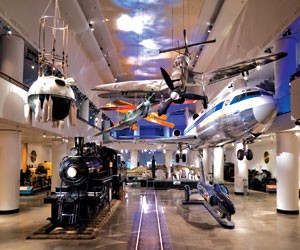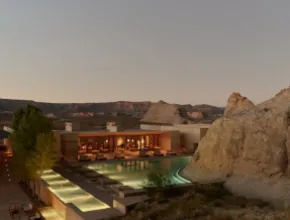American agriculture leads the world in food production and research, supports 16 million American jobs, and draws the world to regard its operations. Many ag industry groups gather in the Midwest because of the region’s unique resources—including factories, museums and research facilities—for farm and plant tours that help educate farmers and producers from around the globe.
The following organizations provide farm tours for groups, or can arrange for such excursions.
Ag Tours Illinois
www.agtoursillinois.com
A partnership among the convention and visitor bureaus of Chicago, Champaign County and Moline/Quad Cities in Illinois offers groups a rich resource for farm tours.
Itineraries vary according to group interests, according to Dan Gleason, group and international sales manager for the Quad Cities CVB. Farm tours are especially popular with international groups, that want to learn American industry techniques for increasing crop yield.
“We get out on family farms and do meals, meet representatives from farm bureaus and have Q&A time,” Gleason says. “We also partner with The University of Illinois College of Agriculture. The professors talk crop science, guide visitors through the local soy bean research lab and talk about topics of interest.”
A sample farm tour for five to seven days might have the group fly into Chicago and begin with a Chicago city tour and river cruise, followed by a visit to farm exhibits in the Museum of Science & Industry and then head to the Morton Arboretum in Lisle, Ill., one of the world’s largest outdoor museums, and which offers many plant varieties.
In Champaign County, a group might visit an experiential dairy farm and the University of Illinois College of Agriculture facilities, stop in at a grain terminal and at the Tony Noel Agricultural Technology Center to learn about soil science of fertilizer and chemical applications.
In the Quad Cities area, groups can visit the John Deere Historic Site and see a blacksmith demonstration, have a factory tour and move on to family and high-tech farm sites, with both grain and livestock production.
“Domestic groups from the ag industry might prefer less technical tours than our internationals,” Gleason says. “They could be more interested in sites that portray the history of John Deere the man, and tour the 19th century homes that belonged to his grandchildren. Several are large mansions that are available for private events and alternative meeting spaces.”
Michigan Farm Bureau
www.michfb.com
Groups visiting Michigan will find a great deal of agricultural diversity, according to Jeremy Nagel, communications specialist for the Michigan Farm Bureau.
“Only California raises more than Michigan,” Nagel says. “This is thanks to the moderating effects of Lake Michigan, which makes our west coast cooler in summer and warmer in winter. The climate, coupled with sandy soil, gives us a lot of crops.”
It’s possible to showcase several kinds of farms within a couple of hours—even more on the west coast—and the farm bureau works with planners to set up tours, Nagel says.
Swisslane Dairy Farms, near Grand Rapids, is one Michigan family farm that welcomes professional groups. Two farms milk nearly 2,000 cows, some with a conventional system, and 500 with a newly installed robotic facility. The robotic method is new to Michigan and the U.S., says the farm’s tour and event organizer, Annie Link.
“We can accommodate groups of up to 50 people,” she says, “and typically our guests learn about our four-generation operation and how we care for our cows. We explain feeding, bedding and housing and, of course, the milking operation. We can include hayrides and show them our robotic facility. The system gives us information about a cow’s health.”
The new robotic system also ensures a higher milk quality, she explains.
Agrivent Production
www.agriventproduction.com
Independent ag industry meeting and event planner Danielle Tolan, president of Agrivent Productions in Indianapolis, says her industry is very technology driven, and farm tours are important education and networking tools for ag groups.
“Technology is more prominent in our industry than outside people realize,” Tolan says. “As an example, farmers now have GPS units on their tractors and they don’t even have to steer it because the unit knows how much acreage it has to cover. Many of our tours are designed to showcase the new ways of doing things that often include new tech tools.”
Farm tours are a great way connect the audience to both the farmland and encourage discussion about new technologies and production techniques in general, she says.
“The ag industry is so large and diverse that maybe the dairy industry is doing something that might be good for the pork industry, but they don’t often communicate with each other. The tours are a good way to get that going,” Tolan says.
Her services include organizing meetings with farm tour components for industry people meeting in nearby Indianapolis.
“A dairy farm producer might ask me to plan a catered lunch or brunch for other farmers in his area so they can network and connect about a new technique that is on display,” Tolan explains. “Perhaps they are producing cheese or yogurt. We would have that on the menu and the guest farmers would see how it’s being made on the host farm.”
St. Louis Anheuser-Busch Brewery and Farm Tours
www.grantsfarm.com
Groups may tap into the Anheuser-Busch corporate history and brewing technique at the company’s original brewery site in downtown St. Louis, where the company began in 1852.
Various tours are available, and several are free for groups of up to 50 people. Included are the brew house, packaging plant, aging cellar and the Budweiser Clydesdale horse stables.
Guests see brew kettles, feel the cool Lager Cellars and hear the thunder of bottles and cans flying by on their high-speed packaging line. Product samples follow the tours for adult guests.
For more in-depth looks at the brewing process or instruction on becoming a beer connoisseur, there’s the Beermaster Tour and Beer School.
“Ag industry people are frequently interested in the ingredients we use in the brewing process,” says Kendra Quartz, tour supervisor.
Event space, tours and team-building options are available at Grant’s Farm, the 281-acre ancestral Busch Family home and farm, located about 20 minutes from downtown. Two hospitality rooms—one for up to 200 people and the other for 100 guests—are available in the evenings for dinners and tours. Farm tours are included in space rental fees. Guests usually enjoy the farm’s tram ride through deer park, the Bauernhof garage—which houses the historic collection of Busch family carriages—and the Budweiser Clydesdales on their home turf.
Brian McBride, manager of special events and food service at the farm, says team building is becoming a popular addition to the farm’s group repertoire.
“Groups may do team relay races, rope tosses and goat herding, for starters,” he says. “We’ve created as many as 10 different events—a sort of field-day for fun—and we offer catered, casual fare.”
Des Moines CVB
www.seedesmoines.com
Because the city is host to many corporate headquarter offices for agricultural industry organizations, as well as headline events for the field, Des Moines is an epicenter for ag meetings and events, says Katie Stein, national sales manager for the Des Moines CVB.
“The world headquarters for seed company Pioneer Hi-Bred International is here, and it brings a lot of meetings to town,” Stein explains. “They do a lot of genetic testing, and plant tours of their operation are popular, depending on a group’s interest and how scientific they want to get. Pioneer even grows bugs from all over the world to test how they affect various plants like corn and other crops.”
The city also has a John Deere plant that makes sprayers, cotton picking and tillage equipment. Tours of that facility are often given to ag groups meeting in Des Moines.
“The Iowa State Fair in August is so famous and well known in the ag industry that it brings in a lot of meetings,” Stein says. “It’s 10 days of events, and the presence of a lot of ag industry celebrities make it a neat opportunity for meetings because they can get speakers who are at the fair. Also, livestock groups are here for showings, so all the national cattle breeds are here.”
The World Food Prize (think the Nobel Prize for food) is granted every October in Des Moines, and the award event draws many scientists, especially from developing countries, Stein adds. The event brings in around 3,000 attendees and many tour the headquarters building of the World Food Prize Foundation. The annual award honors individuals who make significant contributions to improving the quality, quantity or availability of food throughout the world.
“Des Moines has so many unique components to draw ag meetings here,” Stein says, “and we are located right in the middle of the U.S., with airlift that is improving all the time. Ag meetings find a lot to like in Des Moines.”
Ruth A. Hill, a freelance writer, is a frequent contributor to Meetings Focus MidAmerica.






